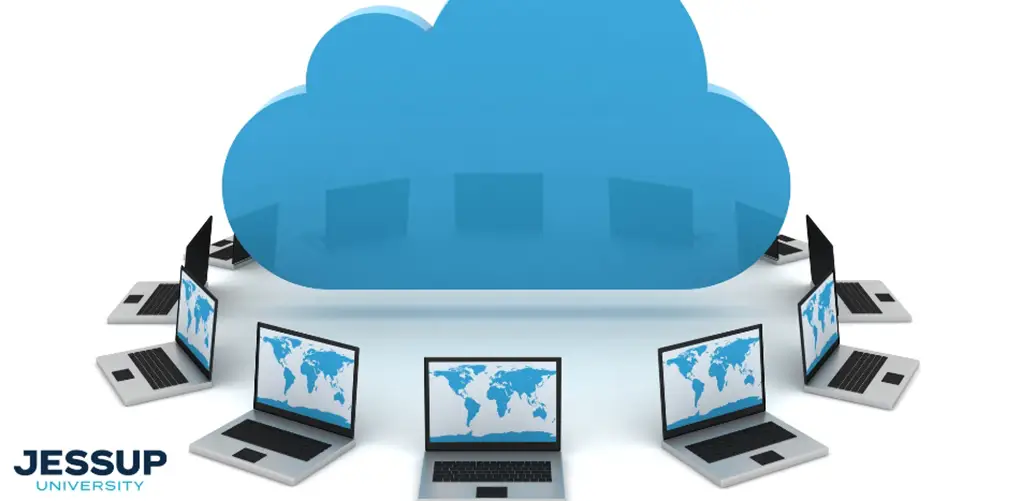
What is the Future of Cloud Computing in 2024 and Beyond
Cloud computing has revolutionized how businesses access computing resources, store data, and deploy applications. Instead of maintaining expensive on-premises infrastructure, companies can leverage the cloud for greater flexibility, cost-efficiency, and innovation.
As technology continues advancing rapidly, what does the future hold for cloud computing? This article explores the key cloud computing trends set to shape the next phase of growth and transformation across industries.
A Brief History of Cloud Computing
To understand where cloud computing is headed, let’s first examine how we got here. Cloud computing refers to the delivery of computing services like storage, servers, databases, networking, analytics, and more over the Internet. These resources are housed in remote data centers operated by cloud providers.
The roots of cloud computing trace back to the 1950’s, when large mainframe computers were shared via time-sharing systems. This allowed multiple users to access the same machine simultaneously for better efficiency.
In the 1990’s, telecom companies began offering VPN’s that enabled businesses to outsource computing needs securely over the Internet. Salesforce.com pioneered the Software-as-a-Service (SaaS) model in 1999.
The launch of Amazon Web Services (AWS) in 2006 marked the mainstream emergence of on-demand cloud infrastructure services for businesses. Today, the cloud has become integral to how enterprises operate, spurring the rise of leading providers like Microsoft Azure, Google Cloud, and Oracle Cloud.
Want To Learn Computer Science From Home?
Jessup University’s Unique Online BS in Computer Science Can Make It Happen!
The Explosive Growth of Cloud Adoption
The cloud computing industry has witnessed immense growth over the last decade. According to Grand View Research, the worldwide public cloud services market is forecast to grow 14.1% from 2023 to 2030.
Several factors are fueling rapid cloud adoption globally:
- Flexibility and cost-efficiency
- Faster innovation and time-to-market
- Seamless scalability
- Enhanced collaboration
- Disaster recovery and business continuity
The COVID-19 pandemic also accelerated cloud migration, with businesses needing digital resiliency and remote productivity capabilities. By 2025, Gartner predicts over 85% of global organizations will embrace a cloud-first principle.
Key Trends and Predictions For Cloud Computing
Let’s explore the major developments and forecasts set to shape cloud computing in the coming years:
Growth of Hybrid and Multi-Cloud
Most enterprises now use a mix of cloud environments, with significant growth expected in both hybrid cloud services and multi-cloud strategies:
- Hybrid cloud blends public cloud and on-premises private cloud/data centers, allowing businesses to optimize deployment across environments. According to Gartner, nearly 50% of mid-to-large organizations will use hybrid infrastructure by 2028.
- Multi-cloud leverages multiple public clouds from different vendors like AWS, Azure, and GCP. This mitigates vendor lock-in risks and enables accessing best-in-class services. Faction Inc states that 93% of large companies are already pursuing a multi-cloud strategy.
Clearly, the future will be dominated by cloud environments meshed with existing systems. The ability to operate seamlessly across hybrid and multi-cloud will be vital for IT teams.
The Rise of Edge Computing
Edge computing brings data processing and analysis closer to devices and end-users, at the “edge” of networks rather than centralized cloud servers. Its key advantages include:
- Reduced latency for real-time application response
- Better connectivity for remote locations
- Enhanced privacy and security
- Lower bandwidth usage leading to cost savings
From retail stores analyzing IoT sensor streams to factories monitoring autonomous machines, edge use cases are expanding rapidly. By 2025, Gartner expects over 75% of enterprise-managed data will be created and processed outside data centers and clouds.
Clouds Enabling Emerging Technologies
The scalable infrastructure of public clouds is driving experimentation with bleeding-edge technologies across sectors:
- Cloud-based AI helps even small companies harness the power of machine learning.
- Quantum computing-as-a-service makes this revolutionary technology accessible for businesses exploring potential applications.
- As the number of connected devices snowballs, clouds provide the storage and real-time analytics backbone for realizing the Internet of Things (IoT) at scale.
Ultimately, the symbiotic relationship between cloud computing and emerging technologies will be the foundation for continued business innovation.
Greater Focus on Cloud Security
Is cloud security a good career path? In short, absolutely. See, as cloud adoption accelerates, security threats are also becoming more egregious. Hackers are devising more sophisticated attacks targeting vulnerabilities in cloud architectures.
High-profile cloud breaches coupled with expanding data privacy regulations emphasize the need for robust cloud security capabilities:
- Protecting sensitive data via encryption and tokenization
- Leveraging AI/ML for threat detection and response
- Designing intrinsic security aligned to DevSecOps methodologies
- Achieving compliance with regulations like GDPR, CCPA, and HIPAA
Moving forward, security can no longer be an afterthought. It must be an integral part of cloud-native development targeted at combatting modern threats.
Further Democratization via Low-Code/No-Code
Low-code/no-code platforms allow creating applications faster with minimal coding. These intuitive drag-and-drop interfaces maximize developer productivity.
As cloud adoption grows across smaller companies with lean IT teams, simple cloud provisioning and configuration tools will empower lines-of-business to directly leverage cloud capabilities without being bottle-necked by technologists.
Cloud Interoperability and Portability
Vendor lock-in has made migrating applications and workloads between cloud providers challenging due to proprietary interfaces and services. Emerging open standards are tackling impediments to interoperability:
- OpenTelemetry: Allows monitoring cloud-native apps across environments
- Open Usage Commons: Provides transparency by standardizing cloud billing
- Open Data Protocol: Enables data exchanges between cloud data warehouses
Moreover, technologies like containers facilitate packaging apps for seamless portability across multi-cloud. As barriers erode, businesses can avoid lock-in risks and switch cloud providers easily.
Why It’s Critical to Stay Updated on Cloud Advancements

Cloud computing forms the backbone for digital innovation across sectors. As emerging technologies like AI, blockchain, quantum computing, and edge solutions mature, they will extensively leverage cloud platforms and infrastructure.
To spearhead change and maintain competitiveness, companies must actively monitor the cloud landscape as it continues to rapidly evolve. They need to understand paradigm shifts related to new architectures such as microservices, serverless computing, and SASE.
It’s also important to keep pace with how modern cloud security strategies are enhancing protection for complex multi-cloud environments. Overall, cloud will be the fuel powering product development, customer experiences, and business growth.
Do You See Your Future in the Cloud?
The Computer Science program at Jessup University offers specialized coursework covering the most essential aspects of the cloud ecosystem that companies urgently demand – from core infrastructure knowledge to cutting edge development paradigms.
Educational Pathways for Cloud Computing Prospects
Considering a career in cloud computing? Jessup University’s Bachelor of Science in Computer Science presents an in-depth program that fuses theoretical foundations with practical application. With options for both in-person and online learning, our approach is adaptable to various educational preferences, allowing students to excel in their chosen format.
In-person attendees will benefit from 15-week courses, immersive community involvement, and comprehensive resource access. Those opting for the online route can take advantage of shorter, 7-week courses, flexible scheduling, and six annual start dates. This program offers specializations in Cybersecurity, Data Analytics, Data Science, Information Technology, and Software Engineering, providing a customized educational journey whether you’re on campus or studying from afar.
Jessup University’s Program Focus Areas and Principal Courses:
Cybersecurity (Online Only):
- Introduction to Cybersecurity
- Cybercrime and Governance
- Contemporary Cybersecurity
- Network and System Security
- Cyber Forensics
Data Analytics (Online Only):
- Foundations of Data Analytics I & II
- Data Analytics Principles & Techniques I & II
- Data Analytics Practicum
What is Data Science:
- Data Science 1 & 2
- Introduction to Artificial Intelligence
- Calculus II, Linear Algebra, Intro to Mathematical Proofs
Software Engineering Concentration:
- Mobile Computing
- Web Stack Technologies
- Data Structures & Algorithms 2
- Database Systems
…and more.
Crucial Skills for Success in Computer Science
What is computer science? It’s the field of study that focuses on computation, information, and automation using computers and computational systems. It’s the backbone and foundation behind software engineering, and can lead you many directions within the tech space.
Prospering in the ever-changing field of computer science is tied to a robust skill set. Jessup University’s program stresses expertise in advanced programming languages, proficiency in modern software development methodologies, and effective technical communication – to bring you the cloud computing skills necessary to conquer this world.
The curriculum deepens understanding of computational challenges, their requirements, and constraints. Additionally, it embeds a Christian ethical outlook towards technology, preparing graduates to be proficient and morally responsible in their field.
Whether participating in on-campus activities or via online modules, students are groomed to deploy their skills in various professional settings, armed with our Computer Science degree.
| Jessup University CS Degree Feature | On-Campus Experience | Online Experience |
|---|---|---|
| Class Length | 15 weeks per course | 7 weeks per course |
| Educational Setting | Direct interaction, community integration | Flexible, home-based learning |
| Program Focus Areas | Cybersecurity, Data Analytics, Data Science, Software Engineering | Cybersecurity, Data Analytics (Exclusive to Online) |
| Primary Courses | Programming, Data Structures & Algorithms, Mobile Computing, Data Science, Database Systems | Same as on-campus |
| Unique Advantages | Access to campus facilities, peer tutoring, campus events | Online resources, virtual tutoring |
| Enrollment Periods | Standard semester system | Six enrollment periods annually |
| Ethical Framework | Christian ethics incorporated in studies | Consistent with on-campus ethics |
Want To Learn Computer Science From Home?
Jessup University’s Unique Online BS in Computer Science Can Make It Happen!
We’ve Explored the Full Scope of Cloud Computing
We’ve explored the full scope of cloud computing – from its start – to its possibilities in the future. Cloud computing is more than a virtualized data center model – it’s a portal to the transformative technologies that underpin the way we solve challenges and imagine new opportunities.
Cloud solutions make it economical for companies to embrace emerging innovations without be slowed down by physical IT limitations or associated costs. Imagine leveraging cloud’s nearly limitless scale, geographic reach, and intelligent services to tackle your most ambitious visions. What breakthroughs will you develop? In what ways will you contribute and make a difference harnessing this potential? There are countless possibilities, only limited by creativity and drive to keep pushing boundaries using tools cloud places at your fingertips.
The world of cloud computing overflows with potential waiting to be tapped. Your ideas have the power to make real, positive impacts transforming lives. Jessup University is where your passion for technology can evolve into a fulfilling career centered around conceiving what’s next. Contact us today to start your journey and begin shaping the future of cloud!
More Engineering & Technology Articles
-

The Critical Role of Programming in Computer Science
From websites and apps to artificial intelligence and cybersecurity systems, computer programming is the universal language that powers our digital world. As an integral aspect of computer science,…
-

Does Computer Science Require Math?
From powering complex algorithms to enabling data analytics and cryptography systems, math serves as the lifeblood underpinning innovation across practically all core computer science domains. But with diverse career…
-

What is the Average Starting Salary for Computer Science Graduates?
Graduates with a degree in computer science are in high demand in virtually every industry. According to the U.S. Bureau of Labor Statistics (BLS), employment…
